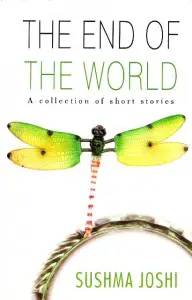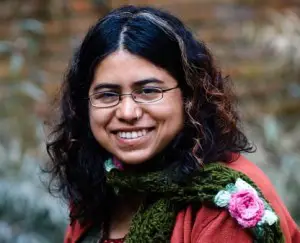 Landlocked in the heart of South Asia between China and India, Nepal is a country known worldwide for its beautiful scenery and violent political struggles. Sushma Joshi, a Nepali writer and filmmaker based in the capital city of Katmandu, portrays in her collection of short stories, The End of the World, a world full of wonder, desire and acceptance of the fact that life is not fair. Longlisted for the Frank O’Connor International Short Story Award, The End of the World was published in 2008 by Fine Print Books and consists of eight short stories.
Landlocked in the heart of South Asia between China and India, Nepal is a country known worldwide for its beautiful scenery and violent political struggles. Sushma Joshi, a Nepali writer and filmmaker based in the capital city of Katmandu, portrays in her collection of short stories, The End of the World, a world full of wonder, desire and acceptance of the fact that life is not fair. Longlisted for the Frank O’Connor International Short Story Award, The End of the World was published in 2008 by Fine Print Books and consists of eight short stories.
In Cheese, the opening short story, we find out about Gopi’s desire to taste cheese. He waits twenty years until he can afford the expensive delicacy only to be disgusted by its taste. Betrayal follows the friendship between Mahesh and Bhai, two construction workers who met in Bombay. On their return to Nepal, they join the Maoist insurgency fighting the government forces, but their destinies eventually take them down two different roads. And then, after years of being apart, the betrayal.
Waiting for Rain presents the discrepancies between poor villagers whose own sustenance are the crops they plant, and the corrupt politicians who steal from the farmers and then expect them to vote for them. Law and Order deals with the shattered dreams of a young Nepali man who, after being rejected by the British Gurkha Army, joins the ranks of the Police Force of Nepal. But, after he spends his entire first salary on booze, and has no money for food, the vegetables in the garden neighouring the police headquarters become Bishnu’s obsession.
When the end of the world was prophesized by a “great and learned sadhu [mystic],” everybody seems to enjoy their last hours on earth, indulging in expensive food that could have fed an entire family for a week. And then, the last day of the world arrives… The short story The End of the World was republished this year in The Mammoth Book of Apocalyptic Sci-Fi (edited by Mike Ashley). In Match-Making, Sharmila, a sixteen year old girl, is being inspected as a potential wife by the relatives of a young Nepali man.
 In Green Dragonfly, the reader witnesses the destructive force of nature: floods and subsequent landslides erase entire villages off the map. As stranded survivors struggle to stay alive once the deluge is gone, corrupt government officials and scruples merchants make huge profits by selling food sent for relief. The short story brings to mind Marcel Proust’s A la Recherche du Temps Perdu, as Kamala recalls the horrifying experiences of her childhood: “Everywhere she went there was the presence of death, the smell of warm air and strange shapes of light showing the dusty crevices of night in a way that she had never seen before.”
In Green Dragonfly, the reader witnesses the destructive force of nature: floods and subsequent landslides erase entire villages off the map. As stranded survivors struggle to stay alive once the deluge is gone, corrupt government officials and scruples merchants make huge profits by selling food sent for relief. The short story brings to mind Marcel Proust’s A la Recherche du Temps Perdu, as Kamala recalls the horrifying experiences of her childhood: “Everywhere she went there was the presence of death, the smell of warm air and strange shapes of light showing the dusty crevices of night in a way that she had never seen before.”
The last short story in the collection, The Blockade, brings to light the fact that the violent political struggle between the Maoists, Democrats and Royalists only created more suffering for the people: “The Maoists had called the blockade. The idea was to choke off the landlocked country, slowly choke off its food, medicine and other essential goods until the people, hungry and full of rage, would come out on the streets…” As in many other places around the world, Thailand included, selfish politicians had only one thing in mind: power.
The End of the World by Sushma Joshi is an excellent radiography of the recent history of Nepal, with an emphasis on the effect of the People’s Revolution on the poor Nepali population, whose major daily concern was making sure their families had enough food on the table. A special feeling of place is given by the frequent use of Nepalese words, which, unfortunately, are not explained within the text nor collected in a glossary at the end of the book. But, apart from the odd typo, Sushma Johi put together a valuable collection of short stories that I’m sure will be of even more historical and social interest in future years.
